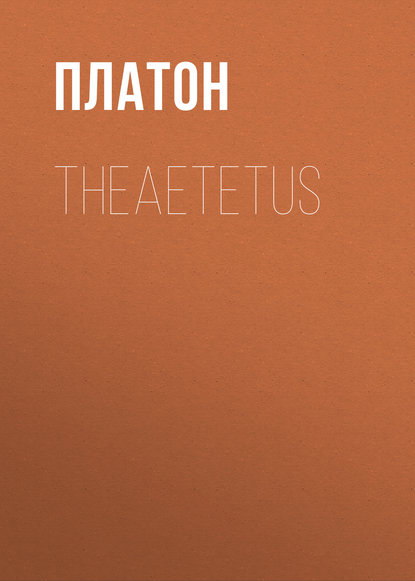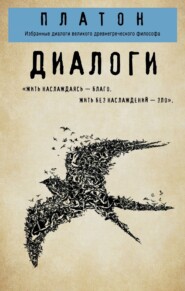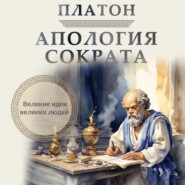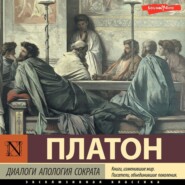По всем вопросам обращайтесь на: info@litportal.ru
(©) 2003-2024.
✖
Theaetetus
Настройки чтения
Размер шрифта
Высота строк
Поля
SOCRATES: And can he who misses the truth of anything, have a knowledge of that thing?
THEAETETUS: He cannot.
SOCRATES: Then knowledge does not consist in impressions of sense, but in reasoning about them; in that only, and not in the mere impression, truth and being can be attained?
THEAETETUS: Clearly.
SOCRATES: And would you call the two processes by the same name, when there is so great a difference between them?
THEAETETUS: That would certainly not be right.
SOCRATES: And what name would you give to seeing, hearing, smelling, being cold and being hot?
THEAETETUS: I should call all of them perceiving – what other name could be given to them?
SOCRATES: Perception would be the collective name of them?
THEAETETUS: Certainly.
SOCRATES: Which, as we say, has no part in the attainment of truth any more than of being?
THEAETETUS: Certainly not.
SOCRATES: And therefore not in science or knowledge?
THEAETETUS: No.
SOCRATES: Then perception, Theaetetus, can never be the same as knowledge or science?
THEAETETUS: Clearly not, Socrates; and knowledge has now been most distinctly proved to be different from perception.
SOCRATES: But the original aim of our discussion was to find out rather what knowledge is than what it is not; at the same time we have made some progress, for we no longer seek for knowledge in perception at all, but in that other process, however called, in which the mind is alone and engaged with being.
THEAETETUS: You mean, Socrates, if I am not mistaken, what is called thinking or opining.
SOCRATES: You conceive truly. And now, my friend, please to begin again at this point; and having wiped out of your memory all that has preceded, see if you have arrived at any clearer view, and once more say what is knowledge.
THEAETETUS: I cannot say, Socrates, that all opinion is knowledge, because there may be a false opinion; but I will venture to assert, that knowledge is true opinion: let this then be my reply; and if this is hereafter disproved, I must try to find another.
SOCRATES: That is the way in which you ought to answer, Theaetetus, and not in your former hesitating strain, for if we are bold we shall gain one of two advantages; either we shall find what we seek, or we shall be less likely to think that we know what we do not know – in either case we shall be richly rewarded. And now, what are you saying? – Are there two sorts of opinion, one true and the other false; and do you define knowledge to be the true?
THEAETETUS: Yes, according to my present view.
SOCRATES: Is it still worth our while to resume the discussion touching opinion?
THEAETETUS: To what are you alluding?
SOCRATES: There is a point which often troubles me, and is a great perplexity to me, both in regard to myself and others. I cannot make out the nature or origin of the mental experience to which I refer.
THEAETETUS: Pray what is it?
SOCRATES: How there can be false opinion – that difficulty still troubles the eye of my mind; and I am uncertain whether I shall leave the question, or begin over again in a new way.
THEAETETUS: Begin again, Socrates, – at least if you think that there is the slightest necessity for doing so. Were not you and Theodorus just now remarking very truly, that in discussions of this kind we may take our own time?
SOCRATES: You are quite right, and perhaps there will be no harm in retracing our steps and beginning again. Better a little which is well done, than a great deal imperfectly.
THEAETETUS: Certainly.
SOCRATES: Well, and what is the difficulty? Do we not speak of false opinion, and say that one man holds a false and another a true opinion, as though there were some natural distinction between them?
THEAETETUS: We certainly say so.
SOCRATES: All things and everything are either known or not known. I leave out of view the intermediate conceptions of learning and forgetting, because they have nothing to do with our present question.
THEAETETUS: There can be no doubt, Socrates, if you exclude these, that there is no other alternative but knowing or not knowing a thing.
SOCRATES: That point being now determined, must we not say that he who has an opinion, must have an opinion about something which he knows or does not know?
THEAETETUS: He must.
SOCRATES: He who knows, cannot but know; and he who does not know, cannot know?
THEAETETUS: Of course.
SOCRATES: What shall we say then? When a man has a false opinion does he think that which he knows to be some other thing which he knows, and knowing both, is he at the same time ignorant of both?
THEAETETUS: That, Socrates, is impossible.
SOCRATES: But perhaps he thinks of something which he does not know as some other thing which he does not know; for example, he knows neither Theaetetus nor Socrates, and yet he fancies that Theaetetus is Socrates, or Socrates Theaetetus?
THEAETETUS: How can he?
SOCRATES: But surely he cannot suppose what he knows to be what he does not know, or what he does not know to be what he knows?
THEAETETUS: That would be monstrous.
SOCRATES: Where, then, is false opinion? For if all things are either known or unknown, there can be no opinion which is not comprehended under this alternative, and so false opinion is excluded.
THEAETETUS: Most true.
SOCRATES: Suppose that we remove the question out of the sphere of knowing or not knowing, into that of being and not-being.
THEAETETUS: What do you mean?
SOCRATES: May we not suspect the simple truth to be that he who thinks about anything, that which is not, will necessarily think what is false, whatever in other respects may be the state of his mind?
THEAETETUS: That, again, is not unlikely, Socrates.

















